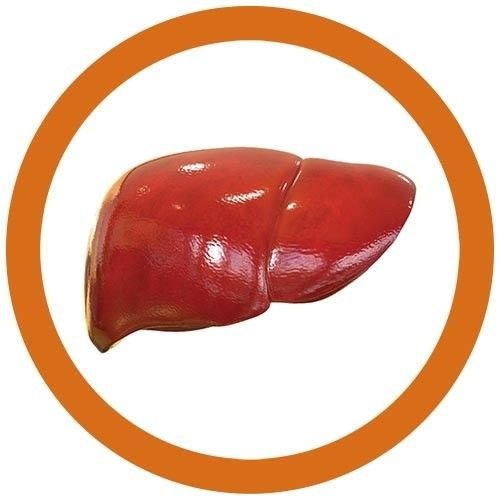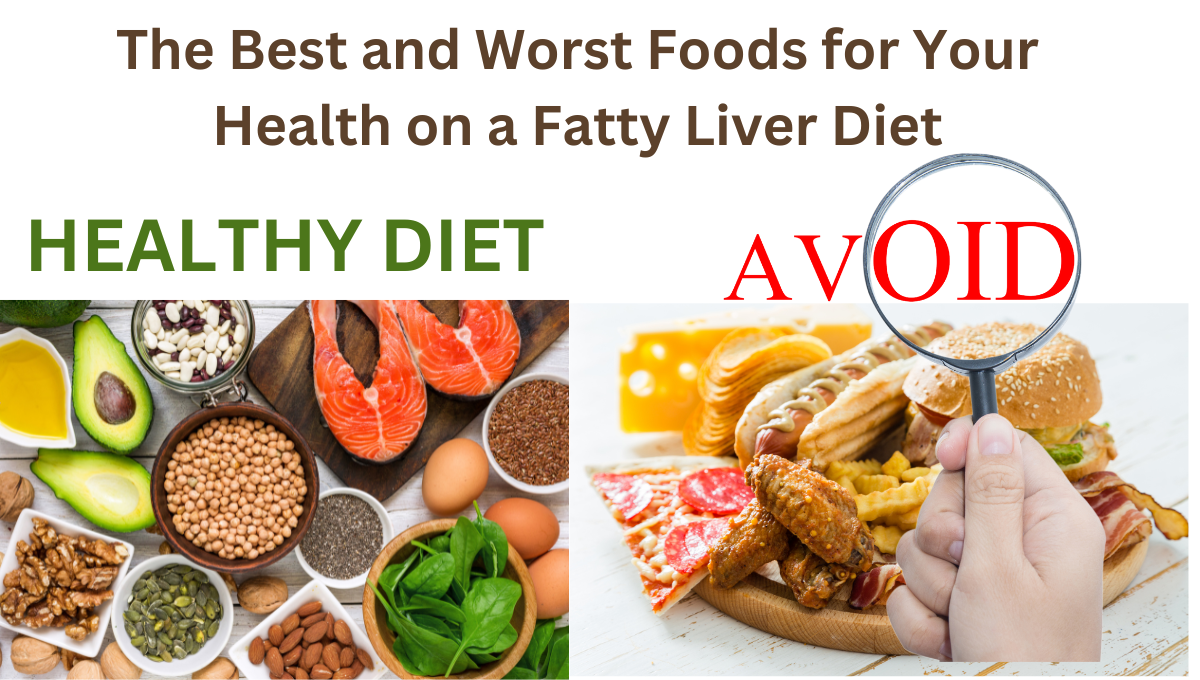The Best and Worst Foods for Your Health on a fatty liver diet
The Best and Worst Foods for Your Health on a Fatty Liver Diet
The buildup of extra fat in the liver cells is a frequent ailment known as fatty liver disease. It affects millions of individuals globally and is frequently linked to type 2 diabetes, obesity, and high cholesterol. Fatty liver can lead to more serious liver diseases such as cirrhosis, liver cancer, and non-alcoholic steatohepatitis (NASH) if treatment is not received. Making dietary adjustments is one of the best strategies to control and even treat fatty liver disease. The finest and worst foods for your health if you have fatty liver disease will be discussed in this post.


Liver Wellness
Understanding Fatty Liver Disease
Alcoholic fatty liver disease (AFLD) and non-alcoholic fatty liver disease (NAFLD) are the two primary forms of fatty liver disease. Although metabolic factors like obesity, insulin resistance, and elevated triglycerides are associated with NAFLD, excessive alcohol consumption is the root cause of AFLD. The liver is essential for both detoxifying toxic chemicals and metabolizing nutrients. Overindulgence in fat can cause inflammation, harm to the liver, and a decline in liver function.
Dietary Management of Fatty Liver Disease
In order to effectively manage fatty liver disease, diet is essential. Liver fat can be decreased, liver function can be enhanced, and future liver damage can be avoided with a nutritious and well-balanced diet. The secret is to prioritize eating foods that support liver function and stay away from meals that increase inflammation and fat storage. Now let’s discuss which meals are best and worst for treating fatty liver disease.
Leafy greens are one of the best foods for fatty liver.
Collards, kale, and spinach are examples of leafy greens that are nutrient-dense and full of vitamins, minerals, and antioxidants. They are excellent for liver health and weight management because they are low in calories and high in fiber. Compounds in leafy greens boost the liver’s detoxification activities and help minimize inflammation. Including a range of leafy greens in your diet will help support liver health overall and supply vital nutrients.
For instance, a salad of kale and spinach dressed with lemon-tahini sauce.
- Oily Fish
Omega-3 fatty acids are abundant in fatty fish, including trout, sardines, salmon, and mackerel. These good fats can lower liver fat, increase insulin sensitivity, and have anti-inflammatory qualities. Additionally, omega-3 fatty acids help lower triglyceride levels and support heart health, both of which are critical for those with fatty liver disease. Try to eat seafood that is high in fat twice a week or more.
Example: Steamed broccoli and quinoa alongside grilled fish.
- Almonds
Nuts high in fiber, antioxidants, and good fats include pistachios, walnuts, and almonds. It has been demonstrated that they raise the levels of liver enzymes and lessen oxidative stress on the liver. Nuts are an excellent snack choice for people trying to control their weight and maintain the health of their livers because they also have a pleasing crunch.
As a midday snack, try a handful of mixed nuts or sprinkle them over a salad.
- Extra Virgin Olive Oil
Olive oil, an essential component of the Mediterranean diet, has many health advantages. It has a lot of monounsaturated fats, which aid in improving liver function and lowering liver fat. Additionally, the antioxidant and anti-inflammatory qualities of olive oil shield the liver from harm. For the health of your liver, use olive oil as your main cooking oil and in salad dressings.
As an illustration, drizzle extra virgin olive oil over roasted veggies or mix it into homemade vinaigrettes.
- Avocado
Avocados are a great source of fiber, antioxidants, and good monounsaturated fats. They maintain the health of the liver by boosting the levels of good cholesterol (HDL) and lowering bad cholesterol (LDL). Avocados’ high fiber content promotes healthy blood sugar levels and facilitates digestion. Adding avocados to your diet can make foods taste creamy and nutrient-dense.
Example: Avocado slices on whole-grain toast with lime juice and a dash of sea salt.
- Complete Grains
Whole grains high in fiber, vitamins, and minerals include quinoa, brown rice, barley, and oats. They promote healthy digestion and blood sugar regulation, both of which are critical for those with fatty liver disease. Additionally, whole grains offer a consistent energy source and, by encouraging a sensation of fullness, can aid in preventing overeating.
As an illustration, consider an oatmeal bowl covered with fresh berries and honey.
- Grass tea
Green tea is well known for having a lot of antioxidants, especially catechins, which can help the liver and prevent fat from accumulating. Drinking green tea on a regular basis has been linked to a decreased risk of liver disease. To maintain liver function, a delightful and nutritious beverage option is to drink a couple cups of green tea per day.
For instance, savoring a warm cup of green tea with a lemon slice in the morning.
- Fried foods are the worst foods for fatty liver
Fried foods are heavy in calories and harmful trans fats, which can lead to weight gain and a rise in liver fat. Eating fried food can cause oxidative stress and inflammation in the liver. To manage fatty liver disease and support general liver health, one must abstain from fried meals.
For instance, try baked or grilled chicken that has been spiced and seasoned with herbs instead of fried chicken.
- Sweets and Sugar
Overindulgence in sugar is a primary cause of weight gain and hepatic fat accumulation. Foods and drinks with a lot of added sugar, such sweets, sodas, pastries, and desserts, might raise liver fat and cause insulin resistance. It’s critical to consume fewer sugar-filled foods and to choose naturally sweet foods like fruits.
Example: Deciding on a sweet dessert in favor of a fresh fruit salad.
- Foods that have been processed
Processed foods are high in chemicals, carbohydrates, and bad fats that are bad for the liver. These foods usually have a high calorie content and little nutritional value, which causes weight gain and the buildup of liver fat. For the sake of liver health, choose fresh, natural foods over manufactured snacks and meals.
For instance, you may swap out processed chips with fresh veggie sticks or air-popped popcorn.
- Tobacco
Alcohol can greatly exacerbate fatty liver disease and is a key cause of liver damage. Alcohol usage, even in moderate amounts, can cause the liver to become inflamed and fatty. If you have a fatty liver, it is preferable to either completely abstain from alcohol or use it in moderation.
Example: Deciding against booze in favor of sparkling water with a lime slice.
- Beef
Saturated fats found in red meat, particularly fatty slices, can exacerbate inflammation and liver fat. Frequent red meat consumption may accelerate the development of fatty liver disease. Lean protein choices, including turkey, chicken, fish, and plant-based proteins, can help maintain the health of your liver.
For instance, grill a turkey burger that is lean rather than a beef burger.
- Pasta and White Bread
Refined carbs, such as white rice, pasta, and bread, can raise blood sugar levels quickly, which can result in insulin resistance and the buildup of fat in the liver. Selecting whole grain substitutes offers increased dietary fiber, vitamins, and minerals, promoting improved regulation of blood sugar and liver health.
Using whole wheat spaghetti for dinners and whole grain bread for sandwiches are two examples.
- Whole-Grain Dairy
Saturated fats, which are abundant in full-fat dairy products such whole milk, cheese, and butter, can lead to the buildup of liver fat. Selecting non-dairy or low-fat options can assist liver health by lowering consumption of saturated fat.
Example: Using low-fat yogurt or almond milk in place of whole milk.
In summary
Making educated dietary decisions to maintain liver function and stop more damage is essential to managing fatty liver disease. Whole foods high in nutrients, such as leafy greens, fatty salmon, almonds, avocado, olive oil, whole grains, and green tea, can help support liver health and prevent fat from building up in the body. On the other side, controlling fatty liver disease requires avoiding diets heavy in carbohydrates, harmful fats, and processed substances. You may actively improve the health of your liver and your general well-being by eating a balanced, nutritious diet.

